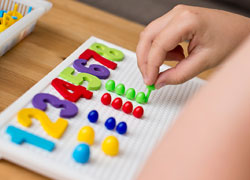Our Services
Educational Therapy Singapore

We are passionate about helping children achieve and progress. Our team of professionals is enthusiastic about helping children through learning activities designed to build on strengths while improving the weaker areas of academics and cognitive skills. We understand that many children who are having trouble coping at school have underlying difficulties which must be taken account of in order to progress in academics.
Our teachers design individual programs to address the cognitive skills of Auditory and Visual Perception and Memory which are important in the learning process. We are committed to an individual approach which identifies the gaps in Literacy, Math and Study Skills and target areas for improvement.
For more details please visit our website
www.edunamics.com.sg
Targeting success in the areas of:
- Improving attention span
- Reducing activity levels
- Psycho-educational assessments
- Targeting educational needs:
- ADD/ADHD
- Dyslexia
- Reading and
- Spelling
- Writing skills
- Mathematics
- CAPD
- Dyspraxia (Motor Planning Issues)
- Language delay

Targeting Success starts with:
- Identifying the child’s needs
- Assessing underlying learning difficulties
- Targeting specific skills to remediate
- Giving recommendations for home and school
With a holistic approach to student’s difficulties which takes full account of the history, profile and needs, your child will receive the attention he or she needs in a warm and positive environment which enables effective learning.
We understand that children learn best when they are motivated and so use a wide range of strategies including computer technology to make education fun but with the emphasis on getting maximum benefit from the opportunities available in the one to one situation.
Each of us thrives on success, so it is an essential aspect of our teaching that we identify the baseline for each student and structure the programmes specifically for the individual, something that is not often possible within larger groups.
Not all students will require standardised assessment. It depends on the student’s history and needs.
Some children need extra support to help them focus and consolidate their daily learning. Others need to improve Literacy and Maths skills by filling in gaps in their previous learning so that they can make the most of their current and future educational opportunities. When a standardised Education Assessment with a full written report would be of benefit, it can be carried out by a senior teacher who is fully qualified and experienced in this area.
In particular circumstances such as when the student history is indicative of Attention, Emotional, Behavioural or medical difficulties and when the report is required by MOE, the assessment can be carried out through the Dynamics Psychology Service.
Otherwise, the baseline for planning purposes will be investigated during the initial sessions of Education Therapy so that the programme can address the weaknesses and utilise the strengths of the individual.
To find out more about how our program can help your child, feel free to contact us, our friendly staff would be more than happy to assist you.
Educational Therapy Fees (Children)
60 – mins
Centre Therapy Session (Subsequent)
from
$
160
/session*
60 – mins
10 Centre Therapy Sessions (Package)
from
$
144
/session*
*Disclaimer – All prices are associated with weekday centre based therapy. Additional cost for Saturday sessions. For home based therapy, additional transport charges will apply. Pricing may change depending on the seniority of the therapist.
How to Get Started
I suspect my child is ADD/ADHD, how can you help me What is Remedial Teaching?
ADHD is a neuro-developmental disorder and its characteristics are:
- Inattention
- Impulsivity
- Hyperactivity (not present in ADD)
- Boys are more commonly affected by it. The estimate of prevalence in the United States is 5-10% of school aged children. The causes of ADHD are yet to be discovered but there are several theories that talk about biomedical, sensory-motor, genetic predisposition and chemical imbalance in the brain.
We can help in four different ways:
- Diagnosis and Behavior Therapy
- Remedial Teaching
- Social Skills Training
- Sensory Integrative Therapy
Diagnosis & Behavior Therapy
Our Educational Psychologists can assess your child to diagnose his condition. Furthermore, they can equip you with practical strategies to manage your child at home and at school.
Remedial Teaching
Remedial teaching is defined as Specialized instruction for students deviating from the expected norm.
At Dynamics Therapy Centre for Kids, we provide remedial teaching services by a special-ed teacher. It may help you child if he appears to be falling behind in his school performance.
Social Skills Training
We conduct social skills training, both one-on-one and in a group setting. Our social skill classes are conducted by a special education teacher and allow children to develop age-appropriate skills of interacting with their peers.
Sensory Integration Therapy
Inattention is caused by the childrens inability to block stimulation that is not relevant to the task at hand. They attend to everything; all stimuli impinge on their senses with equal potency. This causes them to be distracted by the stimulation arriving from their environment (sounds, sights, thoughts etc), and prevent them from paying attention to the task at hand. This is similar to what occupational therapist will call a Sensory Modulation Dysfunction (SMD), where the child has difficulties to organize the degree, intensity, and nature of response to sensory input in a graded and adaptive manner. Sensory Modulation Dysfunction can cause emotional problems as well as attentional problems such as distractibility, impulsivity, disorganization and hyperactivity. mechanism.
Sensory Integrative Therapy provides a potential intervention for ADD/ADHD children without medication.
To modulate is to regulate or adjust to a certain level: To tone down, to adapt to the circumstances On the behavioral level, modulation refers to responses that match the demands and expectations of the environment. Inadequate modulation may result in problems in the following:
- Modulation of sensory input
- Filtering of sensation
- Attending only to relevant stimuli
- Maintaining optimal level of arousal
- Maintaining attention to task
Sensory modulation may be manifested in:
- Distractibility
- Impulsiveness
- Increased activity level
- Disorganization
- Anxiety
- Poor regulation
- Some children will develop inattention which is secondary to a learning disability. These children may become frustrated from academic tasks and they become inattentive as task avoidance
What is Dyslexia and how can you help?
Dyslexia is a type of specific learning difficulty. A child with dyslexia may find reading, spelling and writing difficult, even though he may appear to be very able in other areas. These difficulties are caused by brain differences. This means that your childs difficulties have nothing to do with the way the child is taught, or parenting style, as this is biological.
The difference in the brain makes it more difficult for the child to process information for sounds in language. Therefore, it may take your child a longer time to recognize sounds, and to understand instructions said to him.
Dyslexics have poor phonological awareness, meaning they may find rhymes difficult. They also find it difficult to learn the sounds of the alphabet, and to use this knowledge to help them read or write. Many dyslexics have poor working memory, and so they find that verbal information such as spoken words are quickly forgotten.
Sometimes, dyslexia is accompanied with poor attention and speech and language development. Saying that, no two dyslexic children are the same. Some may find reading very difficult, some may find it easier, but they read slower. Some have problems with just writing.
Some languages are more difficult for dyslexics than others, and English words are considered to be more challenging for dyslexics, because the spelling is more irregular than for example, Spanish.
While dyslexia will make school more difficult for the child, there is a lot that we can do to help. At the end of the day, we must always remember that every child can learn. Research shows that most dyslexics will learn to read and write.
Some dyslexics can become highly successful. The way the dyslexic brain thinks may be different, and in some cases, this is an advantage. By providing your child with the education they need, the child is more likely to reach their potential.
With appropriate help from specialist teachers and using strategies, the effects of dyslexia can be largely overcome. Research also shows that the differences in the brain can also be overcome with teaching.
At Dynamics Therapy Centre for Kids, we provide dyslexia remediation services as well as speech therapy suitable for children with dyslexia.
What is Educational Therapy?
Educational Therapy is defined as Specialized instruction for students deviating from the expected norm. At Dynamics Therapy Centre for Kids, we provide remedial teaching services by a special-ed teacher. Such services supplement our speech and occupational therapy services and are equally helpful for special needs children as well as any child which appears to be falling behind in his school performance.